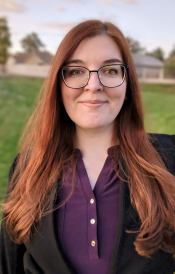PhD grad’s work integrates science, technology and society to promote just futures
Editor’s note: This story is part of a series of profiles of notable spring 2024 graduates.
Technology is changing the world in many ways and has the power to help overcome our society's greatest challenges.
Perhaps one of the greatest challenges is the ethical implications of big data — but it's a challenge Elma Hajríc is willing to face as she works toward implementing technology and social science to solve issues related to critical data studies.
Hajríc, who will graduate from Arizona State University in May with a PhD in human and social dimensions of science and technology, is the spring 2024 Outstanding Graduate from the School for the Future of Innovation in Society, an academic unit of the College of Global Futures.
Before pursuing her PhD, she also earned a Master of Science and Technology Policy from the school. She worked alongside her advisor, Katina Michael, a professor at the School for the Future of Innovation in Society and the School of Computing and Augmented Intelligence, on various projects.
Hajríc’s research involves the governance of emerging technologies centered on the future regulation of nonmedical implantable devices — specifically, radio-frequency identification implants (RFID).
“I wanted to continue building my understanding of questions related to data and society, and I enjoyed the sense of community so much, so I enrolled in a PhD program at the same school,” she said.
Throughout her master’s program, she researched privacy policy through different lenses and learned about AI, science, and technology through coursework at Sandra O’Connor College of Law.
She worked as a Science and Technology Assessment and Analytics Fellow for the U.S. Government Accountability Office in Washington, D.C., as part of her internship. There, she got to experience the operations of the supreme audit institution and the rigor of their work.
“It was a phenomenal opportunity I felt very lucky and grateful to have experienced; everyone was so kind, respectful, and collaborative as all of it was a team effort, and they made me feel like I belonged and had valuable contributions, even as an intern,” Hajríc said.
“The internship experience in D.C. was a monumental achievement for me personally, as a refugee who had never been there before, and as a first-generation student.”
During her PhD at ASU, Hajrić also worked as a fellow for the National Science Foundation Research Traineeship program, where she researched socio-environmental practices and policies for citizen-centered smart cities and smart urbanism. She credited her cohort and project coordinator, Ding Ding Zheng, who managed the grant project, for providing support and a sense of community.
“It was really interesting to exchange perspectives with my engineering and computer science peers, and I have learned a lot and find some of their work really inspiring and groundbreaking in wanting to help people via technology with considerations of social implications as well,” she said.
Her doctoral dissertation focused on sociotechnical imaginaries of the smart campus at ASU through IoT (Internet of Things) SMART poles. She implemented data studies from an intersectional feminist technoscience lens to research surveillance and the concept of data justice.
“I advocate for rebalancing power asymmetries to create a just and equitable future that is genuinely inclusive of everyone,” she said.
After graduation, Hajríc hopes to pursue academia further, either as a professor or a postdoctoral scholar, and contribute to research in the field through publications and other collaborations. She is also open to career opportunities in other sectors.
Below, the recent PhD graduate shared with us about her ASU journey.
Question: What was your “aha” moment when you realized you wanted to pursue your field of research?
Answer: Prior to attending ASU, I was a volunteer with the Amnesty International Tempe chapter group. In 2014, Amnesty dispatched on-the-ground observers in the U.S. for the first time in response to the Ferguson protests. That was the first time I started seriously questioning surveillance, privacy and technology, as distressing video livestreams of unrest and oppression took over the internet in an unprecedented amount. I started wondering, what if someone doesn’t want to go viral, on the news in the background and all over social media? What if they’re in witness protection? Do we have any opt-out mechanisms as technology and surveillance capacities advance? And that’s when I began delving further into privacy and surveillance considerations from a policy and data governance interest.
Q: Which professor taught you the most important lesson while at ASU?
A: The professors I worked closest with as mentors — Katina Michael, Marisa Duarte and Nicholas Proferes, associate professor of the School of Social and Behavioral Sciences — are wonderfully genuine, kind and compassionate people, as well as brilliant researchers and professors. They collectively taught me the possibility and importance of cultivating academic spaces based on the values of compassion and collaboration. I am honored to have had the opportunity to work with them in my PhD journey and can only hope to be as good of an academic as they are and pay it forward with how supportive and knowledgeable they’ve been. I’ve learned so much about my research topics as well, and they inspire me to be the kind of academic they are.
Q: With expertise in topics of artificial intelligence, sustainability, technology and smart urbanism, could you explain the implications of AI for smart cities?
A: Artificial Intelligence has become a hot topic recently, but it’s not a new concept. AI development has been in the works since the 1950s. Despite all of the hype, AI has limitations, including material sourcing and human labor required to maintain these infrastructures that pose challenges to sustainability goals.
There is no singular way AI is integrated into smart cities, but it becomes part of the fabric as data is networked and exchanged through personal devices, vehicles, and other transportation and city infrastructures that use AI-enabled software for things like parking, traffic monitoring and surveillance.
Q: Following up on that, what are some opportunities and challenges posed? How can we better prepare for that future?
A: In the smart city context, the biggest threats I see with AI applications pertain to issues of surveillance, with facial recognition being the most notable example. AI often comes with problems of gendered and racialized bias embedded in algorithms, among other classification issues. Smart technologies, sometimes aided with AI and ubiquitous surveillance capacities, tend to harm historically marginalized groups disproportionately.
While AI implementations are said to serve complex social problems like sustainability and help community health and safety, the use cases can quickly become about control, power, and oppression if not carefully guided. Smart technologies have promising benefits in assisting sustainability goals and deployments in health care, but deliberate implementations and guardrails are required to preserve democratic values and human rights.
Q: What’s something you learned while at ASU — in the classroom or otherwise — that surprised you or changed your perspective?
A: I had actively avoided ChatGPT prior to being a TA for the prompting course, and I was at first surprised by its features in the paid version. It can be helpful for minor uses and basic questions if you don’t want to bother someone else with them in academia. I still sometimes refer to it, which surprises me, but it quickly hits a wall regarding its limitations. It started making things up by referring to articles and organizations that don’t exist and getting very simple things wrong, like dates of the year. ChatGPT still has a really long way to go to live up to the current hype around it and deep sociotechnical problems to address.
Q: What’s the best piece of advice you’d give to those still in school?
A: Stay rooted in preserving humanity, empathy and compassion, and be committed to practicing community care and genuine inclusivity in all you do. Be kind whenever possible; you never know what stressors people are already dealing with and going through, and even your smallest acts of compassion matter. Make space for and care about others. There is room for all of us to succeed — share the spotlight and empower others and be community oriented; we really need more community-building efforts.
More Sun Devil community

ASU president connects with veterans during town hall
Arizona State University President Michael Crow shared his family’s military background, provided university updates and reaffirmed ASU’s commitment to military-affiliated students during a town hall…

Tested tips for taking exams
With May quickly approaching, many students are starting to prep for their most important tests of the year — final exams.Toni Miceli, the inaugural director of the bar exam success program at…

School of Transborder Studies celebrates 15th anniversary
During the summer before his freshman year at Arizona State University, Salvador Macias participated in the AGUILA Youth Leadership Institute, a college access organization designed to help young…


